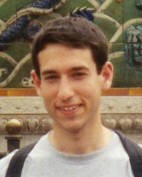
David
Rothstein
2005 - 2006 CSIP Fellow
Research Interest:
Astrophysics
I came to Cornell in the fall of 2000 and am currently
a Ph.D. student in astrophysics. My research involves
studying the environments around black holes and the complex
processes that occur as material swirls into them. Although
most people think of astronomy as constant and unchanging
(if you observe the sky night after night, most stars
look exactly the same), black holes are an amazing exception.
The black holes I study are more massive than the Sun,
but they would fit comfortably in the space between Binghamton
and Syracuse, and therefore the "weather" around
them can change as fast as the weather in upstate New
York does (and in some cases much faster). My research
involves observing this "black hole weather"
with telescopes and trying to predict it with computer
simulations.
As
a CSIP fellow, I would like to use the enthusiasm that
most students have about astronomy to teach them ideas
that are applicable in other areas of science. For example,
Einstein's theory of relativity, which governs the behavior
of black holes (as well as more practical things such
as the Global Positioning System), is a subject that can
be understood conceptually by high school students and
that can be made to mesh with curricula in many classrooms,
including physics, math and geometry (in the past I've
even taught it to an English class). When students realize
that they can understand the basic ideas behind this seemingly
complex theory, they gain confidence about their scientific
abilities and a willingness to ask the types of probing
questions that Einstein spent his career asking. In addition,
I am interested in working with existing science curricula
to help emphasize the idea of uncertainty in science --
the fact that we can never measure things exactly and
that sometimes (particularly in astronomy), our uncertainty
is so great that the best we can do is make very rough
estimates, which nonetheless can still give us important
insights about how the universe works.

